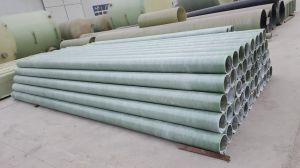Feb. 21, 2023
Construction & Real Estate
When it comes to selecting the best material for industrial and commercial applications, Fiber Reinforced Polymer (FRP) and Glass Reinforced Polymer (GRP) are two popular options. Both materials offer significant advantages over traditional materials like steel or concrete, but there are some differences that make one material better suited for certain applications.

FRP is a composite material that combines a polymer matrix with fibers made from carbon, glass, or aramid. The combination of materials results in a lightweight and strong material that is resistant to corrosion, weathering, and a range of chemicals. On the other hand, GRP is a composite material that uses a polymer matrix and fibers made from glass to create a material that is lightweight, durable, and resistant to corrosion.
One of the primary advantages of FRP over GRP is its superior strength-to-weight ratio. FRP is stronger and stiffer than GRP, which means it can be used in applications where a high strength-to-weight ratio is critical. This makes FRP ideal for structural applications like bridges, decks, and flooring, as well as for making products like pipes, tanks, and other industrial equipment.
Another advantage of FRP over GRP is its ability to resist fire. FRP is inherently fire-resistant, which means it will not easily catch fire or spread flames. This makes FRP an excellent choice for applications where fire safety is a concern, such as in buildings, vehicles, and aerospace applications.
On the other hand, GRP has some advantages over FRP as well. One of the primary advantages of GRP is its excellent electrical insulation properties. GRP is an ideal material for electrical and electronic applications, as it does not conduct electricity and can withstand high voltages. This makes it an excellent choice for making electrical enclosures, switchgear cabinets, and other equipment.
Featured content:GRP also has better corrosion resistance than many other materials, including steel and aluminum. This makes it ideal for outdoor applications where exposure to harsh weather conditions and corrosive materials is a concern. GRP is often used to make products like storage tanks, pipes, and other equipment that are exposed to the elements.
When it comes down to selecting the best material for a particular application, it is important to consider the specific requirements and characteristics of the application. Both FRP and GRP have unique advantages and disadvantages that make them better suited for certain applications.
In general, if strength and fire resistance are the primary concerns, FRP is the better choice. FRP is an excellent choice for structural applications, as well as for making products that need to withstand high temperatures or exposure to fire.
If electrical insulation or corrosion resistance is the primary concern, GRP is the better choice. GRP is an excellent material for making electrical and electronic equipment, as well as for outdoor applications where exposure to the elements is a concern.
In conclusion, both FRP and GRP offer significant advantages over traditional materials, and the selection of the best material depends on the specific requirements of the application. By considering the unique properties of each material, it is possible to make an informed decision and select the material that will provide the best performance and durability for the given application.
Featured content:Related Articles
If you are interested in sending in a Guest Blogger Submission,welcome to write for us!
All Comments ( 0 )